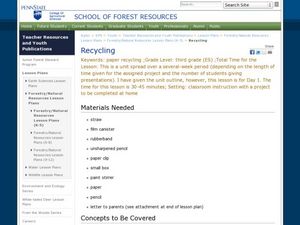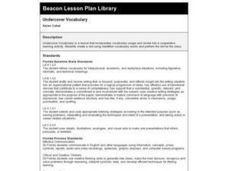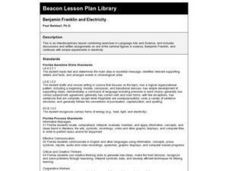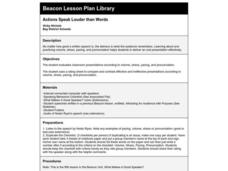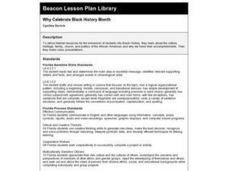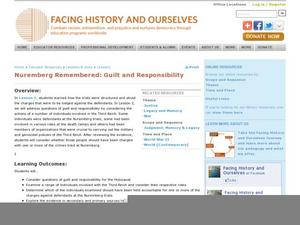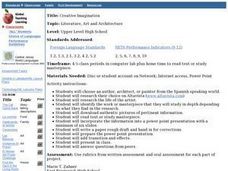Curated OER
Creating a Travel Brochure
Students use the internet to research a country of interest to them. Using graphics, they create a travel brochure about the country encouraging people to travel there. They present their information to the class while showing their...
Curated OER
Recycling: Creative Uses for Items
Third graders list creative uses for old objects. In this recycling lesson, 3rd graders work in groups to brainstorm creative, new uses for old, everyday items. This is the first lesson in a unit on recycling.
Curated OER
Tooling Around Arizona: Reading Arizona Maps
Students research Arizona maps. In this map lesson, students discuss map titles, scales, directions, elevation, and symbols. The class will examine topography, landforms, and rivers found on an Arizona map.
Curated OER
Undercover Vocabulary
Fourth graders, in groups, create a skit using identified vocabulary words and perform the skit for the class. They choose a place and a person to become such as Batman, Romeo and work all the vocabulary words into their skit. They...
Curated OER
Could You Repeat That?
Students participate in an oral story telling activity designed to show how story embellishments occur. They read "Beowulf" and identify incongruities that suggest additions and embellishments over the years.
Curated OER
Benjamin Franklin and Electricity
Second graders study Benjamin Franklin and participate in simple experiments in electricity.
Curated OER
Underground Rails: The New York City Subway System
Students explore the New York Subway system. They investigate its usefulness as mode of transportation for the people in the city and study its history compared to other city subway systems. They examine how the subway connects the...
Curated OER
Dia de los Muertos
Students practice Spanish vocabulary and grammar while focusing on the cultural differences between Mexico and the United States. They demonstrate their knowledge of the holiday, Dia de los Muertos, by giving a presentation in Spanish.
Curated OER
Ch'in (Qin) Dynasty Debate on Censorship
Sixth graders learn team building, fair play, keeping an open mind towards others' opinions, U.S. government policies, and a better understanding of the meaning of censorship as they debate the merits of censorship.
Curated OER
Strange Stories
Students complete activities about new words. In this new words lesson, students complete activities to teach vocabulary and practice new words. Students read a story and add in the new words.
Curated OER
Changes in Latitudes, Changes in Attitudes
Sixth graders discuss how people, society, and technology change over time through a unit of integrated lessons. In these changes in society lessons, 6th graders discuss the answers to many questions about how changes effect the...
Curated OER
Introduction to Fractions on the Numberline
Learners use color-cued fraction strips and a color-cued numberline to develop basic fraction concepts and correct sequencing. They complete a worksheet using equivalent fractions to solve the problems.
Curated OER
What Affects Plant Growth?
Eighth graders experiment to identify the nine factors needed for plants to grow healthy. They choose one of seven topics to research and develop an experiment based on scientific method, and complete oral and written reports based on...
Curated OER
Describing Patterns
Fourth graders investigate repeating and growing patterns. Models, graphs and words are used to describe, extend and represent patterns. Students use evidence from models and graphs to support the identification of patterns.
Curated OER
The God Ganesha
Students are introduced to Indian Art in the form of carvings and metal sculptures of the god Ganesha. They comprehend the meaning behind the Hindu beliefs of Lord Ganesha. Students draw Ganesha's likeness to the best of their ability.
Curated OER
"An Eye For An Eye, A Tooth For A Tooth"
Sixth graders debate their reactions to two different historical documents about managing a society. For this U.S. history lesson, 6th graders read two articles on codes and laws from different time periods and debate their thoughts.
Curated OER
Actions Speak Louder than Words
Students examine and discuss how volume, stress, pacing, and pronunciation help deliver an effective oral presentation. They listen to a speech by Nolan Ryan, identifying why he is a good speaker, then practice reading their own short...
Curated OER
Why Celebrate Black History Month
Second graders study about the culture, heritage, family, church, and politics of the African-American and why we honor their accomplishments. Then they make class presentations. This is a very meaningful lesson on an important part of...
Curated OER
Nuremberg Remembered: Guilt and Responsibility
Students explore the Nuremberg trials. For this Holocaust instructional activity, students research the Nuremberg trials. They gather primary sources or documents to support their arguments for the charges against people examined in the...
Curated OER
Now You're Speaking My Language; Deciphering the Symbols of Early Civilizations
Young scholars explore early attempts at written language. In this early civilizations lesson plan, students investigate first attempts at written communication. Among the civilizations covered are Mayan, Greek, and Egyptian.
Curated OER
Connecting to Colonial Music
Students listen to songs from the French and Indian War period. They answer questions about the song and identify any historical terms. They examine the role of music in their own lives.
Curated OER
Picture Yourself At New Market
Students explore the functions of technology tools. In this technology instructional activity, students learn how to appropriately use digital cameras and upload pictures to computers. Students also investigate how to use Windows Movie...
Curated OER
This Building is Tall
Young scholars calculate the perimeter of shapes. In this geometry lesson, students relate properties of polygons to the real world. They find length, midpoint and slope.
Curated OER
Spanish Artists in Powerpoint
Students select a Spanish author, architect, or painter to research. After composing a rough draft for teacher review, the give Powerpoint presentations to the class. Students answer questions from peers.



